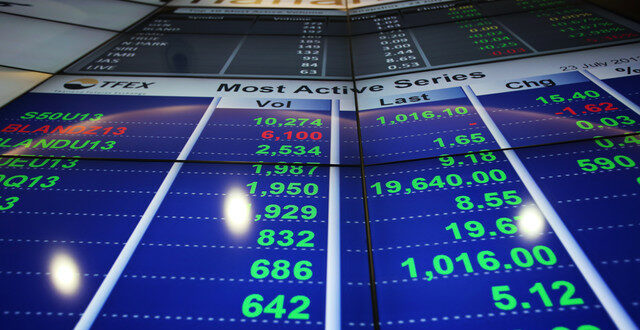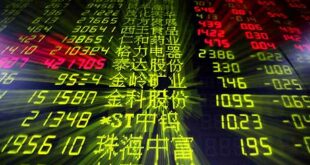Thailand’s stocks are falling at the fastest pace in Asia as an amnesty bill for political protesters spurs demonstrations in the streets of Bangkok and threatens to delay the nation’s biggest-ever infrastructure spending plan.
The SET Index, which rose 328 percent from October 2008 to this year’s high on May 21, has since dropped 13 percent through yesterday as shares of Krung Thai Bank Pcl (KTB) and billionaire Dhanin Chearavanont’s CP All Pcl (CPALL) tumbled. Stock swings in Thailand have almost tripled in the past six months while trading volumes fell 52 percent, the most among 45 emerging and developed markets.
Police closed roads around parliament this week on concern as many as 5,000 people may join rallies against the ruling Pheu Thai party’s bill, which would exonerate protesters jailed after the nation’s military coup in 2006. Debate over the legislation may delay approval of Prime Minister Yingluck Shinawatra’s $64 billion plan to build high-speed trains and highways across Thailand, where government spending accounts for about 24 percent of the economy.
“Political tension and economic slowdown will be the main risks to the Thai market,” Petcharat Powattanasatien, the head of equity investment at Bangkok-based Kasikorn Asset Management Co., the nation’s biggest private money manager with $27 billion of assets, said in a July 31 phone interview. “Any delay in the government’s spending on new infrastructure projects will have a negative impact.”
Volatility Jumps
Thailand’s SET index (SET) rose 1.2 percent to 1,447.16 today after better-than-estimated Chinese trade data eased concern that the biggest emerging economy is slowing.
The gauge’s 30-day historical volatility jumped 180 percent to 25.2 as of Aug. 6 from 9 at the end of January. That compares with a 33 percent drop for the Standard & Poor’s 500 Index (SPX) and a 16 percent increase for the Shanghai Composite Index in China, the biggest emerging market, according to data compiled by Bloomberg.
Thirty-day average volume in the $390 billion equity market, the 11th-biggest in Asia, declined to about 9.8 billion shares from 21 billion in January, which was within 5 percent of a record high. Volume fell to 4.7 billion shares on Aug. 5, the lowest since Nov. 21.
The last time trading in Thailand slowed this much, in November 2010, the SET index dropped about 4 percent during the next 12 months. That compares with a 3.7 percent gain in the S&P 500, the data show.
Relative Value
The SET gauge has more than quadrupled since November 2008 as bond purchases by the U.S. Federal Reserve spurred demand for riskier assets in emerging markets. The Thai economy rebounded from a 7 percent contraction in the first quarter of 2009 to post an average expansion of 4.9 percent during the following three years. Growing consumer demand in the nation of 67 million people boosted car sales to an all-time high in March and lifted earnings at SET index companies to a record.
The Thai stock measure will probably climb about 15 percent this year as earnings growth lures foreign investors, said Korawut Leenabanchong, the chief investment officer at UOB Asset Management (Thailand), which oversees about $6.4 billion. Profits in the SET will probably climb 28 percent in the next 12 months, versus 14 percent for the MSCI Emerging Markets Index, according to data compiled by Bloomberg.
The SET Index is valued at 12.5 times analyst earnings estimates for the next 12 months. That compares with a multiple of 18 for the Philippine equity gauge, 16 in Malaysia and 14 for Indonesia. The MSCI emerging markets index is trading at a multiple of 9.9.
Fed Concern
“Thai stocks have been overpunished,” said Korawut, whose Thai Value Focus Equity-Dividend Fund has returned 16 percent this year, according to data compiled by Bloomberg. “The overall fundamentals of the Thai market remain strong.”
Equities have rebounded after past periods of political tension. While the SET Index lost as much as 13 percent in four months after Thai military leaders sent tanks to block Bangkok’s Government House and said they’d seized control of the capital on Sept. 19, 2006, the gauge recouped its losses by May 2007.
The SET index’s decline from its 19-year high on May 21, the day before Fed Chairman Ben S. Bernanke said in congressional testimony that the central bank could reduce stimulus if the economy improves, is the largest among equity gauges in 18 Asian nations tracked by Bloomberg. Foreign investors sold a net $2.7 billion of Thai shares since the end of March, data compiled by Bloomberg show.
Bloomberg
Photographer: Dario Pignatelli/Bloomberg
 Asia Finance News Asia finance news, banking, market analysis, business, Forex, trade, Cryptocurrency as it is happening in Asia. Trusted gateway for Asian financial news.
Asia Finance News Asia finance news, banking, market analysis, business, Forex, trade, Cryptocurrency as it is happening in Asia. Trusted gateway for Asian financial news.


